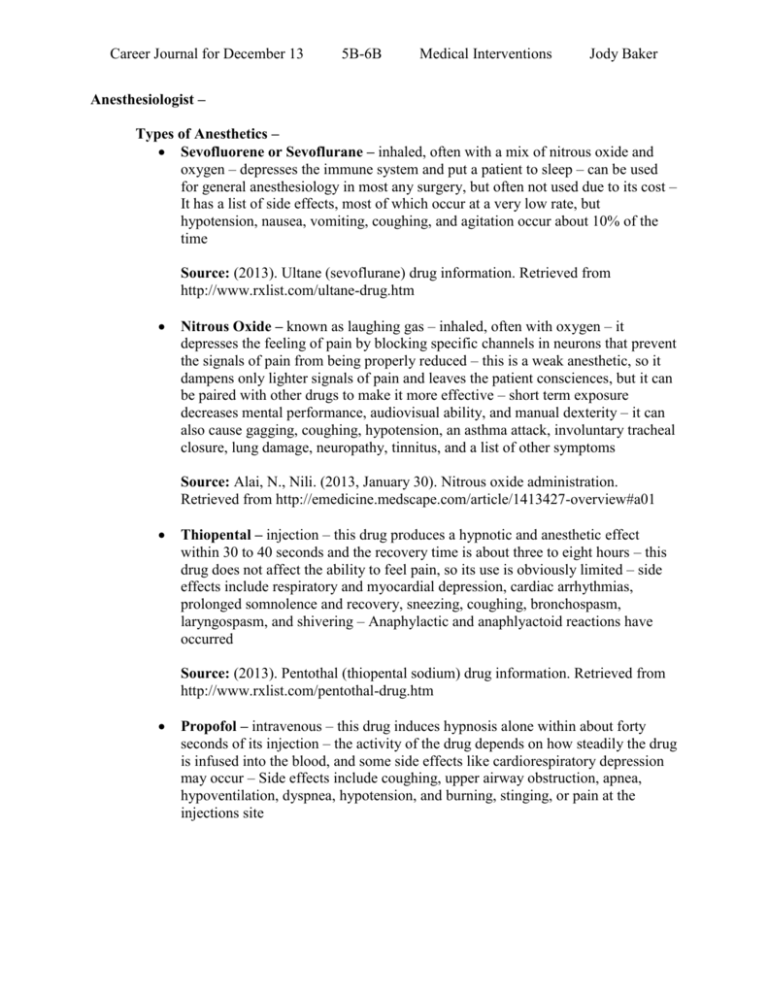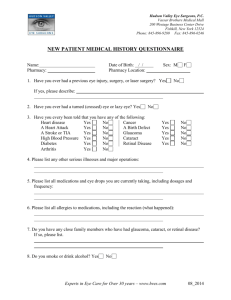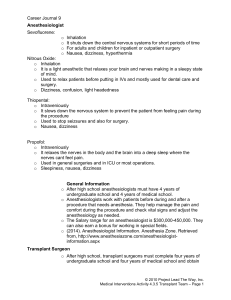File
advertisement

Career Journal for December 13 5B-6B Medical Interventions Jody Baker Anesthesiologist – Types of Anesthetics – Sevofluorene or Sevoflurane – inhaled, often with a mix of nitrous oxide and oxygen – depresses the immune system and put a patient to sleep – can be used for general anesthesiology in most any surgery, but often not used due to its cost – It has a list of side effects, most of which occur at a very low rate, but hypotension, nausea, vomiting, coughing, and agitation occur about 10% of the time Source: (2013). Ultane (sevoflurane) drug information. Retrieved from http://www.rxlist.com/ultane-drug.htm Nitrous Oxide – known as laughing gas – inhaled, often with oxygen – it depresses the feeling of pain by blocking specific channels in neurons that prevent the signals of pain from being properly reduced – this is a weak anesthetic, so it dampens only lighter signals of pain and leaves the patient consciences, but it can be paired with other drugs to make it more effective – short term exposure decreases mental performance, audiovisual ability, and manual dexterity – it can also cause gagging, coughing, hypotension, an asthma attack, involuntary tracheal closure, lung damage, neuropathy, tinnitus, and a list of other symptoms Source: Alai, N., Nili. (2013, January 30). Nitrous oxide administration. Retrieved from http://emedicine.medscape.com/article/1413427-overview#a01 Thiopental – injection – this drug produces a hypnotic and anesthetic effect within 30 to 40 seconds and the recovery time is about three to eight hours – this drug does not affect the ability to feel pain, so its use is obviously limited – side effects include respiratory and myocardial depression, cardiac arrhythmias, prolonged somnolence and recovery, sneezing, coughing, bronchospasm, laryngospasm, and shivering – Anaphylactic and anaphlyactoid reactions have occurred Source: (2013). Pentothal (thiopental sodium) drug information. Retrieved from http://www.rxlist.com/pentothal-drug.htm Propofol – intravenous – this drug induces hypnosis alone within about forty seconds of its injection – the activity of the drug depends on how steadily the drug is infused into the blood, and some side effects like cardiorespiratory depression may occur – Side effects include coughing, upper airway obstruction, apnea, hypoventilation, dyspnea, hypotension, and burning, stinging, or pain at the injections site Career Journal: Education and Training – After getting a Bachelor’s degree, possibly in science, and passing the Medical College Exam, four more years will be spent in medical school with two in class and two as a resident at a hospital. Next a anesthesiology residency is necessary where four years will be spent in general residency and another three completely focusing on anesthesiology and, if one wants a sub-specialty, that means one or two more years. A state license is also necessary by passing a test from the American Society of Anesthesiologists or the American Board of Anesthesiology. A ten year cycle used to ensure their education is up to date with an exam following various courses. Salary – The annual median salary is $232,830. Duties – They monitor patients before, during, and after they are treated with an anesthetic, counteract any adverse reactions to that anesthetic, note the amount and type of anesthetic as well as the patient’s condition throughout the surgery, provide and manage life support measures if applicable, help patients prepare for the surgery, administer the anesthetic using local, intravenous, spinal, or epidural methods, situating patients on the operating table to make sure they are comfortable and accessible, coordinating with the surgical staff during the operation, evaluating when the patient has stabilized enough to leave, and consulting with others to determine what anesthetic and method of using it would be best. Source – (2013). Anesthesiologist. Retrieved from http://www.qualityeducationandjobs.com/anesthesiologist/ Transplant Surgeons: Education and Training – After acquiring a Bachelor’s degree and completing medical school, a five year general surgery residency and board certification from the American Board of Medical Specialists is necessary. Then a two year transplant surgery fellowship that is accredited with the American Society of Transplant Surgeons is needed and a specific number of successful transplants is needed to become certified with that organ. No re-certification is needed, but their certification must be maintained. Salary – The median average salary is $230,540 as of May 2012. Duties – They specialize in the transplantation of specific organs, such as the heart, liver, kidney, or pancreas, and are involved in preparing the organ for transplant, preforming the surgery, and working to ensure that the body does not reject that organ. They often work as part of a transplant program in hospitals or medical centers and are trained in how to remove and preserve the organ from both living donors as well as from cadavers. They are also trained in evaluating a living donor and a responsible for explaining what the recipient and donor must do following the operation to ensure the best outcome. Source – (2013). Transplant surgeon career information. Retrieved from http://educationportal.com/articles/Transplant_Surgeons_Career_Information_for_Students_Interested_in_Perfo rming_Transplant_Surgeries.html Perioperative Nurse: Education and Training – An associate’s or bachelor’s degree in nursing is needed to become a registered nurse. Next, a training a certification program is necessary to become a perioperative nurse. Salary – The median annual salary is $41,000. Duties – All perioperative nurses assist patients receiving surgery by evaluating, preparing, and administering care before, during and after surgery. They preform patient evaluations, sterilizing and organizing the operation room, educating patients about what they should do before and after surgery, monitoring patients during and just after surgery, and coordinating patient care activities with other medical staff. They act as scrub nurses, who give surgeons their tools, sterilize equipment, and perform other routine tasks during surgery, circulating nurses, who assist with surgery by overseeing operating nurses and ensuring the rooms are sterile and safe, and as RN first assistants, who assist with surgical procedures by suturing openings, controlling bleeding, and doing other specialized tasks. Becoming an RN first assistant requires more training. Source – (2013). Perioperative (O.R.) nurse. Retrieved from http://www.collegeatlas.org/perioperative-nurse.html Following a successful transplant, there is always a chance that a person’s body may reject the new organ. The immune system is responsible for seeking and destroying any foreign matter found within the human body and, regardless of how closely the new organ matches the donor’s tissues, it is still recognizable as foreign. The body, upon recognizing the foreign organ, begins destroying it, rendering it as useless as the one it replaced with time. To prevent this, antirejection medications are available to help suppress the immune system and must be taken for life following an organ transplant. Four types of medications are used: corticosteroids, calcineurin inhibitors, antiproliferative agents, monoclonal antibodies, and polyclonal antibodies. Corticosteroids – such as prednisone or methylprednisolone – used directly after a surgery and in gradually decreasing doses after surgery until the lowest possible dose the prevents rejection in reached – the drugs decreases immune activity and reduces inflammation – can temporally cause some side effects like, weight gain, sleeping problems, hypertension, hypercholesterolemia, hallucinations or psychosis with high doses – long term use can cause glaucoma, steroid-induced diabetes, and increase the risk of opportunistic infections Calcineurin Inhibitors – such as tacrolimus or cyclosporine – part of life long care – they block the messages that cause rejection – can cause high blood pressure, hyperkalemia, and kidney problems as well as nausea, vomiting, diarrhea, hypercholesterolemia, tremors, and seizures – can also increase the risk of both infection and cancer Anitproliferative Agents – such as mycophenolate mofetil, azathioprine, and sirolimus – also part of life long care – prevents immune cells from dividing – can cause nausea, anemia, leukopenia, high triglycerids, and intestinal upset – also increase the risk of opportunistic infections, cancer, and other life-threatening conditions Monoclonal Antibodies – such as daclizumab, basiliximab, and rituximab – used early after the transplant with the above two drugs – block the growth of immune cells that are responsible for rejection Polyclonal Antibodies – such as antithymocyte, globulin-equine and antithymocyte globulinrabbit – used in the hours and days after a transplant and if a body begins to reject the organ again – they temporally deplete the body’s immune system – often used early to prevent the use of calcineurin inhibitors for a time, which has some more serious side effects – can cause fever, itching, joint pain, leukopenia, serum sickness, and a condition that prevents the production of antibodies that fight infection – also increase the risk for cancer and opportunistic infections Source – (2010, January 08). Organ transplant. Retrieved from http://www.webmd.com/a-to-zguides/organ-transplant-after-the-transplant Pharmacists: Education and Training – A bachelor’s degree or 2 to 3 years of undergraduate study is needed, depending on the program, but the next step is to take the Pharmacy College Admissions Test. Next a 3 to 4 year stent at a pharmacy college is needed to get a degree. Another one to two year residency will help get an advanced position in fields like clinical pharmacy or research. Salary – The median annual pay was $111,570 in May 2010. Duties – They fill prescriptions and verify instructions from the physicians on the proper amount, check to see if any of the drugs will interact, instruct patients how and when to take the medications, advise them on possible side effects, advise them on general health topics, complete forms from and work with insurance companies, oversee the work of pharmacy technicians and interns, keep records, and teach other health care workers about proper medication therapies. Source - Bureau of Labor Statistics. (2012). Pharmacists. Occupational Outlook Handbook, 2012-2013 edition. Retrieved from http://www.bls.gov/ooh/Healthcare/Pharmacists.htm#tab-1 Career Chosen – Pharmacist Why did you choose this career? o I chose this career because it would provide a fulfilling experience while causing a low rate of anxiety. While I understand the importance of giving everyone what is prescribed and I know the dangers any simple mistake can have, I am fully prepared to double and triple check myself and ask for any help if and when needed. I will enjoy having an interaction with the patients that some medical careers do not provide and having a precise schedule is a nice bonus. What are the most important rewards you expect in your career? o The biggest reward I expect is to see returning patients feel and look better than they did before and knowing I was a part of that, however small that part may be. I will also enjoy explaining to my patients how to properly take their prescriptions and helping them save money however possible. Finally, I will enjoy staying up to date with the latest drugs and understanding not only what I must know, but how they work and how they were developed and, if I am asked, being able to explain it. If I choose to, running my own pharmacy will also be a rewarding experience. What makes you qualified for this position? o I have a bachelor’s degree in organic chemistry and have successfully completed a four year program at a pharmacy college. I have my degree from both and am currently certified to be a pharmacist in this state. What parts of your education do you see as relevant to this position? o My college degree allows me to better understand how the drugs work on the cells and organs in the human body so I will have an above average understanding of the drugs on the cellular level. This will put me in a better position to understand the side effects of the drug and what other drugs will cause complications. My time at the pharmacy college taught me even more about how various drugs work, how the equipment in a pharmacy works, how the computerized system used in a pharmacy works, what drugs can and cannot work together, and various other things that are necessary to work or run a pharmacy. How do you see yourself advancing in this career field? o I plan to either return later and complete a residency program to begin working in research or to one day own my own pharmacy. Do you have a preference between working in research or owning a pharmacy? o At this time no, but I have always wanted to own a business, so I am a bit partial to that side. I believe that research would be fulfilling, but I am afraid of participating in a trial for a drug that can cause the death of one or more patients as it is always a possibility while on the frontier of science. On the other hand, I could participate in a landmark case that ends cancer or Alzheimer’s, so it is a dual-edged sword. Owning a business would be difficult, since I have no experience doing so, but it would be interesting being the master of my domain, so to speak. In all, I am undecided between the two as both have their allures and their flaws.







